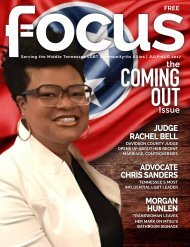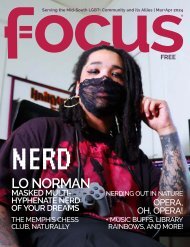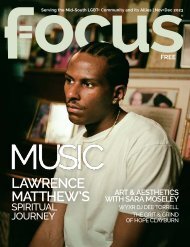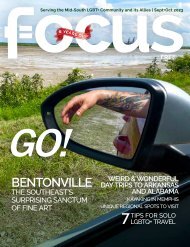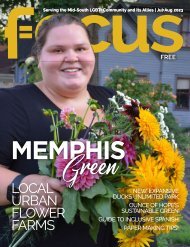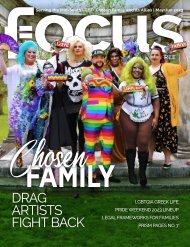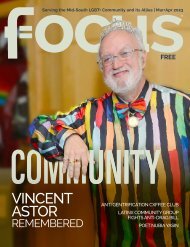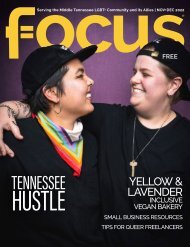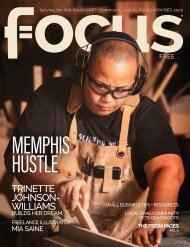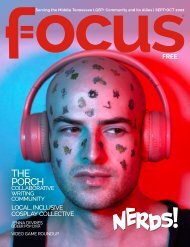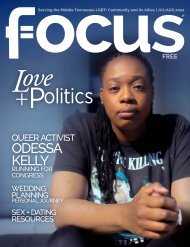Create successful ePaper yourself
Turn your PDF publications into a flip-book with our unique Google optimized e-Paper software.
is the impact of poverty. “The
lack of resources such as food,
shelter, and transportation
make life difficult for so many
Mid-Southerners.” According to
LaBonte, the MCC is a proud
partner in United Way of the
Mid-South’s Driving the Dream
initiative that links families
struggling with poverty into
programs to enhance their
financial stability and transition
them to greater self-sufficiency.
Other major MCC community
partners include the Family
Safety Center that provides
free services for victims of
domestic violence, and the
Crime Victim’s and Rape Crisis
Center that focuses on crime
and sexual assault. The
University of Tennessee Health
Science Center is also a major
partner, providing the MCC with
a home for over 10 years now.
MCC is helping individuals,
but it is also helping
communities and the agencies
who serve those communities.
“We facilitate community
stability by de-escalating
situations that might otherwise
spill over into community
violence. We can link troubled
individuals into systems of
care.”
LaBonte also sees the MCC
as cost effective for the
community. “The ability to
de-escalate crisis situations
before they become acute can
translate into fewer trips to the
ER and less need for costly
on-site active rescue by police
and other emergency services.”
He also sees the value of
hotlines in freeing up 911
dispatchers by creating a
resource for those struggling
with chronic mental illness and
needing somewhere to turn to
cope with daily challenges.
LGBTQ+ Support
Many of us are familiar with
the increased suicidal risk
factors for LGBTQ+ individuals.
LaBonte has a personal
commitment to the cause and
ensuring that the MCC provides
a safe place for LGBTQ+
individuals facing crisis
situations. In the 1990s,
LaBonte was a student activist
with the Bisexual, Gay and
Lesbian Awareness (BGALA)
group at the University of
Memphis, now known as the
Stonewall Tigers. He was
instrumental in the University of
Memphis becoming the first
public university in the state of
Tennessee to include sexual
orientation in its nondiscrimination
policies. LaBonte
says he is especially proud that
the MCC has always been
inclusive. “We’ve even had past
board members that were
active in founding MAGY and
held leadership positions in
TEP.
“We know that LGBTQ+
youth have a greater risk of
suicide, experience higher rates
of discrimination, harassment,
and ... families are still rejecting
their kids for coming out. We
have some great resources
today like OUTMemphis’
Metamorphosis project and
support groups. A little bit of
acceptance for LGBTQ+ youth
can go a long way in preventing
suicide,” according to LaBonte.
“One powerful experience I
had on the crisis line happened
many years ago,” stated
LaBonte. “I received a call from
a 16 year old lesbian in a rural
community. She had been
extremely active in her church
and had recently been outed.
She was devastated by the
rejection she received and had
an immediate and lethal means
to end her life.” During the call,
LaBonte reminded her that she
would not always be in the
place she was that day. “In a
few years, I told her, she would
be able to make her own
decisions and even find an
affirming church family—
something she had never heard
of before...By the end of the call
we had disabled her suicide
plan and she made a decision
to live.”
MCC and COVID
During the COVID 19 pandemic
the MCC has seen an increase in
calls, including a 22% increase
in suicide calls. “More people
are struggling with depression,
anxiety, and loss.” LaBonte
advises on ways to help: “The
truth is we need to be checking
on our neighbors, especially
seniors and other isolated folks,
and making connections in safe
ways like telephone calls. We
need those connections. Call
people. The almost lost art of
telephone conversation is a
safe way to socialize in the
pandemic. We need each
other.”
If you are in need of help, call
(901) CRISIS-7 or 901.274.7477.
For more information, visit
www.memphiscrisiscenter.org
YOUR LIFE
is worth a
PHONE CALL
THERE’S MORE TO LIFE THAN JUST THIS MOMENT.
LET US HELP YOU FIND IT.
The Memphis Crisis Center is a volunteer-powered 24/7
crisis and suicide hotline service.
Our trained volunteers provide help, build hope and save
lives everyday.
901-CRISIS-7 or 1-800-273-TALK (8255)
for deaf and hearing-impaired callers: 711
www.MemphisCrisisCenter.org
To volunteer can contact us at volunteers@crisis7.org




